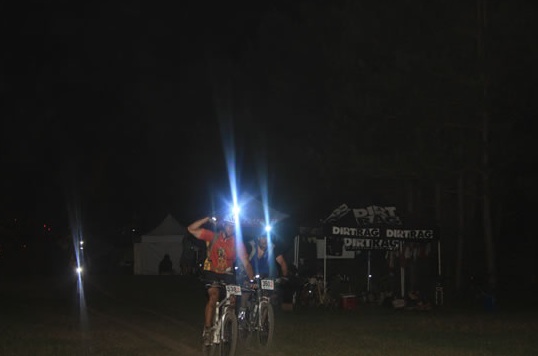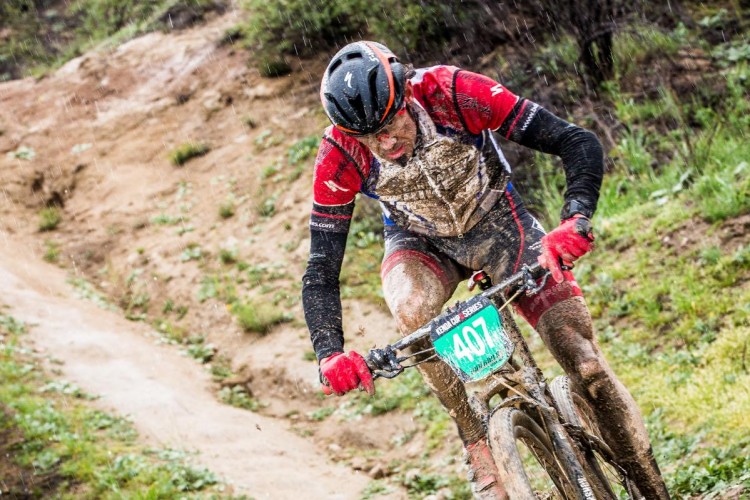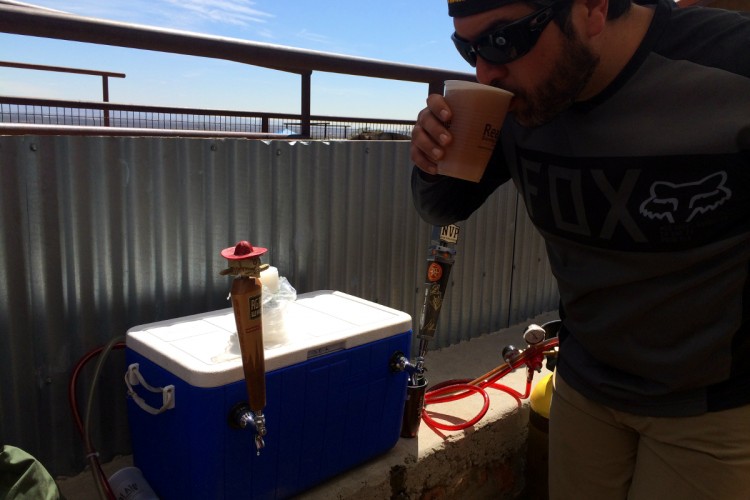Despite news of many major 24-hour races being canceled, not everyone agrees 24 hour racing is dead. If you listen to Tommy Bryant talk for a half an hour, you’ll start believing that while a transition is indeed taking place in 24-hour racing, the format is still thriving.
Shortly after I published the article about 24 Hours of Georgia being canceled, I had the chance to chat with Tommy on the phone about the state of 24-hour mountain bike racing. Tommy is a 24-hour solo racer and, working for Niterider, travels the country visiting races in the Nitetrider Sprinter van with this mobile charging station for Niterider lights:

Tommy Bryant is very passionate about the 24-hour racing format. “We’ve been in business for 25 years and have been supporting races for 23 years,” said Bryant. “24-hour racing in no way shape or form is dying.” According to Bryant, “24-hour racing is special in the fact that people show up on Friday afternoon with their camping equipment and their families and they . . . are able to be there all weekend . . . hang out and camp, do some barbecuing, empty the ice chest . . . there’s just nothing like the festival atmosphere that has been created around the 24-hour premise.”
When asked about the many major 24-hour races that have been canceled in recent years, Bryant responded, “the reason why we’re not seeing huge, huge events is that there are so many [24-hour races] now, with one in every neighborhood. This segment of racing is huge, but we’re just not seeing it like we did back in the day. There used to be two main series, [but] now there are so many grassroots events that we’ve seen the demise of those two companies.”

Despite Bryant’s assertion that there are numerous grassroots events out there, the actual number of events is pretty hard to pin down, since there is no centralized database of 24-hour races, and no centralized database for mountain bike races period. See the meaning of the word “grassroots.”
Still, if anybody is in a position to know how many 24-hour races are out there, it’s Bryant. He constantly has people calling him up, asking Niterider to support their races. Since there are so many events out there clamoring for Niterider’s attention, unfortunately they have to turn down many opportunities.
When asked for his best estimate of the number of 24-hour races in the United States in 2013, Bryant said, “from what I can tell, from phone calls, I would say there are somewhere around 85. I would guestimate there’s at least that many. I mean, I have weekends here on my calendar where there are four races, [and] one [weekend] has five 24-hour races.” That estimate is just for 24-hour races in the United States alone, and doesn’t take into account the calls Bryant receives from Canada, or the endurance racing scene overseas.
Bryant noted, “this year alone I had five new races that had never contacted us before.” There are even grassroots 24-hour races holding their first-ever event this year, including 24hrs of Flathead. However, the race organizer was not available for comment.
Bryant’s comments brought up another, related issue: if there are so many races out there, why haven’t we been made more aware of them? “I would love for there to be a calendar for all these promoters to be able to check a calendar and see if there’s another event going on the same weekend,” said Bryant. But those resources already exist. There are several free mountain bike race databases available on the internet, such as the events listings section on Singletracks.com. Still, it seems like many race organizers are more wrapped up in what takes place on race day than with publicizing the event months beforehand.
When asked about this issue of publicity, Bryant commented, “the races are out there, and they might even be in [the racers’] own neighborhoods. It might be the fault of the promoters—there might not be posters in their local bike shop. Unfortunately, the attendees sometimes have to search for them. Sometimes [the promoters] are their own enemy because they don’t make the phone calls and don’t post their events to all the forums. If they just spent two hours on a computer and posted their event to every website they can…”
While perhaps 24-hour racing is alive and well, it is clear a major transition has taken place in the 24-hour racing scene. The races are still out there but, with a few notable exceptions, they are not big-name events. Perhaps the organizers and the racers want their events to stay low-key. Perhaps these local events are actually the essence of mountain biking. But these races still seem to be official events with entry fees and permitting involved, and so it would seem logical they would want to avoid conflicts with other similar events. Part of that process requires publicity and marketing.
It will be intriguing to see what turns 24-hour racing takes in the future, and the other, larger transitions taking place in mountain bike racing in general.
Your Turn: What’s your take? Is 24-hour racing dead, or is it alive and well?












3 Comments
Jul 2, 2013
I think Tommy is right in implying these events got too big for their own good and putting them on became too expensive or cumbersome for promoters. Grassroots events can help address this. But I think there is a whole host of additional factors at play--the rise of ultra endurance races, cross-country riders moving toward gravity riding, etc.
Mudhunny rode her first 24 Hours of Adrenaline race 10 years ago and since that time there really hasn't been much change to the format so perhaps a reboot is in order. (Here in GA the 12 Hours of Zombie Apocalypse seemed to generate some good buzz.)
Perhaps calling 24 Hour racing dead is overly dramatic but for the moment, the trends don't seem to be in favor of the format.
Jul 1, 2013
Jul 1, 2013
I'd suggest Tommy Bryant create a list of races on the NiteRider site, not with the idea that they would be attending but just to have some kind of clearing house for promoters to get the word out. As you say, Greg, they may be grassroots but one would think they'd want enough entries to make it worthwhile so any way of getting the word out would be of benefit, surely?
Cheers
Barry.